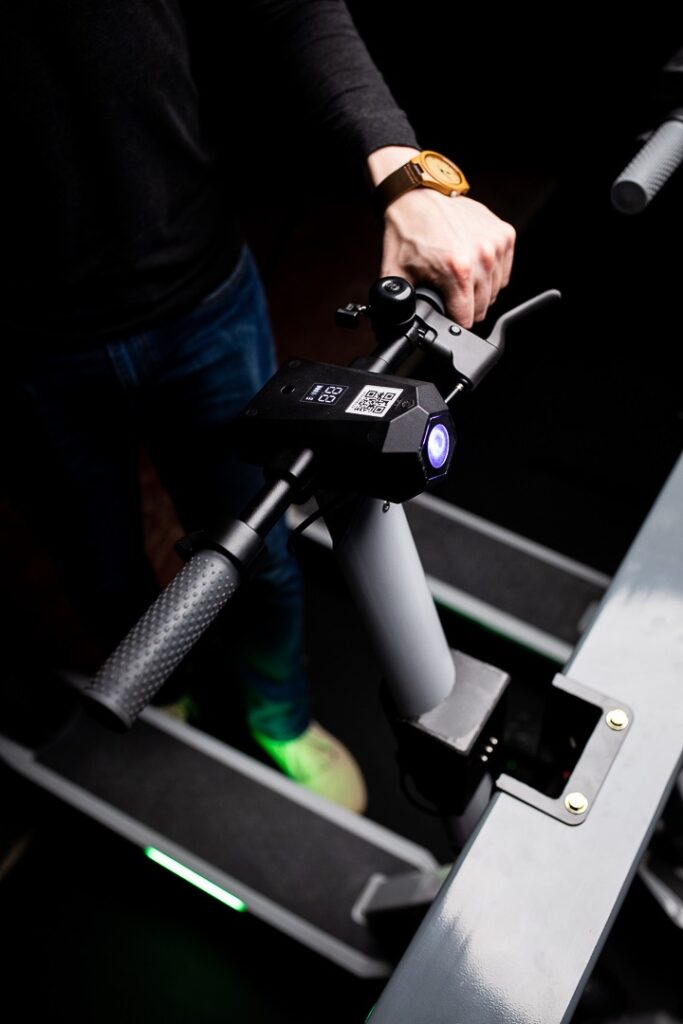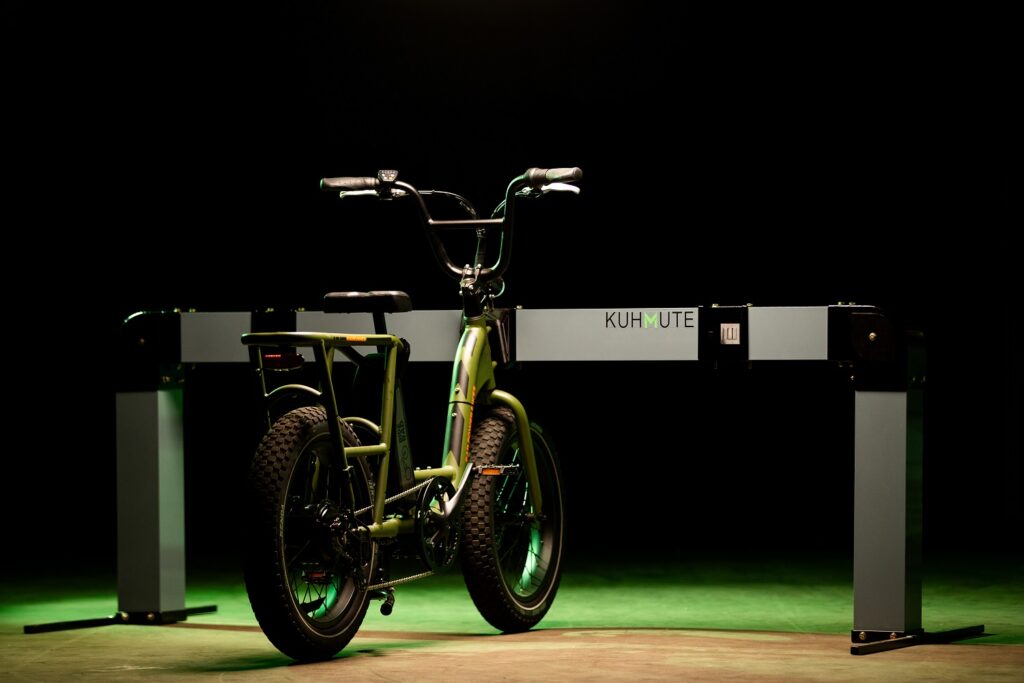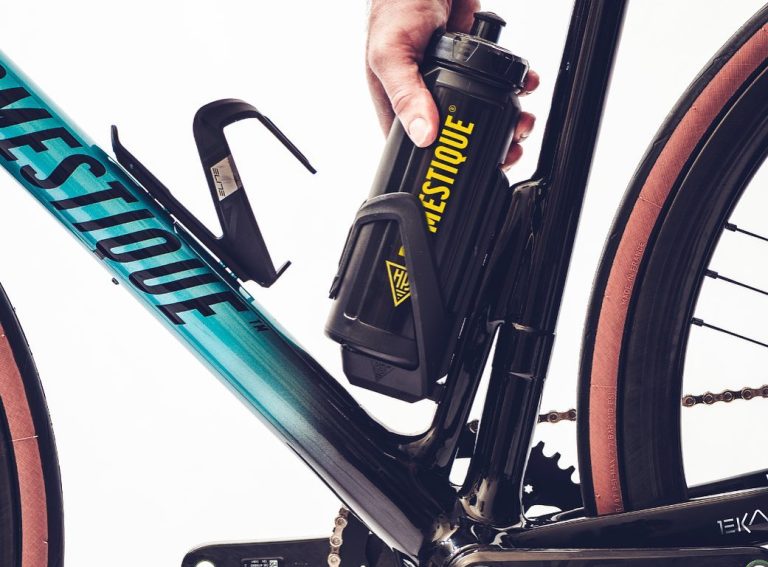Street clutter is one of the biggest headaches for cities hosting shared e-scooter schemes; the process of collecting and recharging scooters is one of the biggest operating costs for scooter operators. Now, two rather elegant and sophisticated solutions are on their way to Britain.
The nature of e-scooter design and deployment means they’ve traditionally been dockless – that is, riders can park up anywhere within a specified service area. Many e-scooter fleet operators require riders to take a photograph at the end of their ride to prove the scooter has been parked considerately, where it is unlikely to cause an obstruction to pedestrians or other road users. In practice, however, this hasn’t worked as often or as well as it ought to.
Charging is another issue that e-scooter rental operators haven’t really cracked yet. At the birth of the industry, in the US, freelance “juicers” would charge around in heavy, hydrocarbon-burning cars and pickup trucks to collect scooters and charge them at home. Not particularly environmentally sensitive. The advent of swappable batteries has meant that entire scooters no longer need to be carried home (or to a warehouse) but still requires a team to sally forth with a basketful of freshly energised batteries at the ready.
Changing course to a docked or hub-based model could help with both challenges, particularly given the narrow pavements of British towns and cities. But corralling scooters in specific locations risks eroding their accessibility, which reduces their usefulness and, therefore, appeal.
Two American companies have devised neat solutions to both problems. Swiftmile and Kuhmute make what are effectively slimline docks for scooters. The units take up very little physical real-estate but offer both a place to safely store scooters and a means to charge them at the same time.
We covered the Swiftmile offering recently. The company is working with Spin in the US and can charge scooters using only solar-power, creating a totally off-grid architecture that could be sited easily in British urban contexts. Simply remove a car parking space to create room for eight e-scooters. Swiftmile has confirmed to Zag that units are shipping to the UK; Spin is running a live trial in Milton Keynes already and will be operating in six cities in Essex, which is were we’d expect to see these pop up.
A service station-style network is likely to be a useful method for minimising the street clutter sometimes associated with shared scooters and meeting the explosion in storage and charging needs that will come with private e-scooter legalisation.
Kuhmute’s is perhaps a more sophisticated bit of product design. It’s a streamlined take which acts as a universal dock: that is, pretty much any electronic wheeled gizmo can connect, by retrofitting a smart locking unit that Kuhmute supplies. E-scooters, e-bikes, electric skateboards, mobility scooters and even autonomous delivery robots can all use the dock once they’re fitted with the smart lock.
The smart lock and docking mechanisms have been designed to be vandal-proof, so once a vehicle has been slotted in, there’s no getting it out without authorisation. (The bolts that hold the smart lock in place are located on the front, where they are hidden once the vehicle is docked.)
Kuhmute currently charges a flat per-minute rate which incorporates the secure parking and charging, but in future will be able to differentiate. So if a rider parks up for eight hours in the office but their e-scooter needs only an hour to charge, they’ll only pay (or the shared scooter operator will only pay) the higher rate while the scooter is drawing charge and then drop down to a simple parking fee after that.
The weak point at the moment is that the smart dock needs to be connected via cable to the vehicle charging port. That leaves exposed components which could be vulnerable to being tampered. The Kuhmute team is working with some of the leading scooter manufacturers to build the smart- lock into the vehicle itself, in order to route these cables inside the handbar stem, out of harm’s way.
There’s more good news with the Kuhmute system. The add-on dock mechanisms can be added to private or fleet vehicles and the unlocking software automatically syncs with the unlock process a rider would follow to access an e-scooter. Translation: the rider just opens the scooter app and unlocks the scooter as per normal, and the dock sorts itself out at the same time. No additional buttons to press or apps to open.
This means the dock can remain busy all day and cuts the number of docks needed if a city is using multiple fleet operators – and when private scooters are made legal. London, here’s looking at you.
(Talking of which, Kuhmute is working with Ginger to introduce a proof-of-concept in the UK, though we haven’t been able to confirm yet where exactly this will be situated.)
One more thing we love about Kuhmute. The company has designed a dock inside a small shipping container. The whole unit can just be picked up and moved to a new location. That not only makes it great for temporary events, such as helping with park-and-ride for major sports games, for example, but it also provides a covered-parking experience that couldn’t be more perfect for British riders.
We think the future of e-scooter transport in the UK will centre on hybrid systems – that is, where scooters are dockless for total door-to-door freedom but where there are also hubs or docks for convenience. Kind of like we already have for cars, in fact. Financial incentives will encourage riders to park up at docks, as long as enough are provided in the right areas.
A service station-style network is likely to be a useful method for minimising the street clutter sometimes associated with shared scooters and meeting the explosion in storage and charging needs that will come with private e-scooter legalisation. The products on offer from Swiftmile and Kuhmute show that businesses and towns don’t need to fear this development: the answers are already being shipped to the UK.





